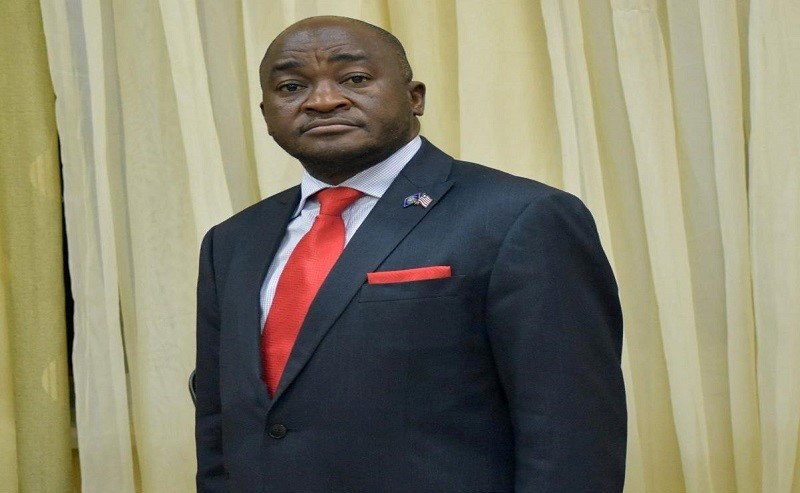Monrovia-Liberia, Wednesday June 10, 2020 – Liberia’s Ambassador to the United Nations Dee-Maxwell Kemayah has reaffirmed government’s unflinching commitment and support to the Zero-Tolerance Policy on Sexual Exploitation.
In a statement delivered during the 2020 Africa Dialogue Series at the United Nations in New York recently, Ambassador Kemayah said Liberia remains committed to the implementation of the United Nations Security Council Resolution 1325.
The UN Resolution 1325 among other things calls for special measures to protect women and girls from conflict-related sexual violence.
Ambassador Kemayah said as Governments around the world continue to address the socio-economic impact of COVID-19, it is important that women and girls are represented at every level of the response.
He thanked the UN Office of the Special Adviser for Africa for organizing the 2020 Africa Dialogue Series and highlighted that 2020 is a landmark year for taking stock on the advancement of women and gender equality.
Ambassador Kemayah averred: “On behalf of His Excellency Dr. George Manneh Weah, President of the Republic of Liberia and Liberia’s Feminist-In-Chief and the Government and People of Liberia; we salute and pay tribute to the Women of Liberia, Africa and the world; and reaffirm our unflinching commitment and support to the Zero-Tolerance Policy on Sexual Exploitation and Abuse, and Women, Peace, Security and Development Agenda; and the implementation of the UN Security Council Resolution 1325.
Ambassador Kemayah declared: “Twenty years of advocacy through UN Security Council Resolution 1325; which calls for special measures to protect women and girls from conflict-related sexual violence; must neither be minimized nor compromised; justice and the rule of law must not fall into abeyance”. He concluded: “As Governments continue to address the socio-economic impact of COVID-19, it is important that women and girls are represented at every level of the response: from planning to decision-making; to ensure effective and sustainable results.
While thanking the United Nations Office of the Special Adviser for Africa for organizing the 2020 Africa Dialogue Series; the Liberian Envoy highlighted that 2020 is a landmark year for taking stock on the advancement of women and gender equality. Said Ambassador Kemayah: “This year is a landmark year for taking stock on the advancement of women and gender equality. It commemorates the Twenty-fifth – 25th Anniversary of the Beijing Platform for Action; as well as the Twentieth – 20th Anniversary of UN Security Council Resolution 1325 on Women, Peace and Security”.
As the 2020 Africa Dialogue Series was held within the context of the COVID-19 Pandemic, Ambassador Kemayah noted that as most countries celebrate the relative progress achieved so far, the COVID-19 Pandemic is, however, threatening these gains, most especially in conflict-related zones; stressing that its devastating effects are beginning to make life further unbearable in these conflict-related zones. Ambassador Kemayah asserted: “the pandemic has had an adverse impact on the world’s socio-economic systems, and worsened the compounding impacts felt by women, girls and the underprivileged”.
The Liberian Diplomat further recounted the challenges that women and girls face; especially during humanitarian crisis; recalling Liberia’s experience during the Ebola crisis. Said Ambassador Kemayah: “during most humanitarian crises, women and girls tend to bear the brunt of the economic, social and health burdens as economic providers and caregivers during the response and recovery stages”.
In this connection, Liberia’s Permanent Representative to the United Nations; while renewing his call for international cooperation and solidarity in response to the COVID-19 Pandemic; emphasized the need to focus on bridging the inequality gap and addressing vulnerabilities and plights of women. Ambassador Kemayah stressed: “It is therefore essential, that, as we renew our call for international cooperation and solidarity in the response to COVID-19, and to ensure relief to our economies; initiatives must consider the socio-economic and financial plight of women. Focus must be placed on bridging the inequality gap and addressing vulnerabilities”.
Said Ambassador Kemayah: “The proliferation of domestic and gender-based violence during this COVID-19 Pandemic is also of major concern”. Ambassador Kemayah noted: “the call by His Excellency, the UN Secretary-General for a global ceasefire and the end to violence everywhere; and the call to silence the gun by His Excellency, the Chairperson of the African Union Commission must be seen in the context of the pandemic as directing all efforts and energy to combating this threat and its impact”. Ambassador Kemayah maintained: “This redirection of focus, however, must neither distract the Zero-Tolerance Policy on Sexual Exploitation and Abuse nor allow impunity to abound”.
The annual Africa Dialogue Series is a global platform that focuses on current and emerging African issues and promotes high-level advocacy for Africa’s peace, security, and development. As a broad forum for a wide range of stakeholders, including policy and decision makers, researchers and advocacy groups, the 2020 Africa Dialogue Series, which was held for Three – 3 days brought together United Nations Member States, United Nations entities, international and regional organizations, civil society, and academic institutions. This year, the Africa Dialogue Series which was conducted virtually in view of the COVID-19 Pandemic was hosted by the Office of the Special Adviser on Africa – OSAA, in collaboration with the African Union, United Nations Economic Commission for Africa, United Nations Department of Political and Peacebuilding Affairs, United Nations Department of Peace Operations, the United Nations Department of Global Communications, and UN Women.

